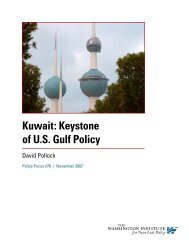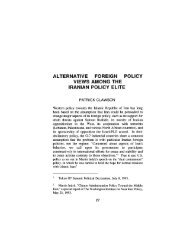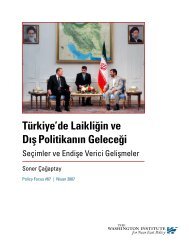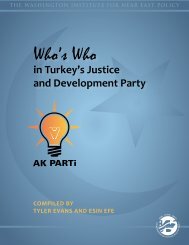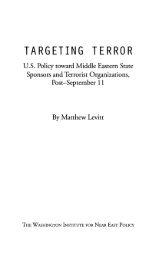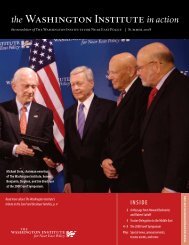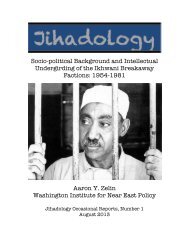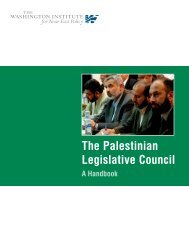Michael Eisenstadt David Pollock How the United States Benefits ...
Michael Eisenstadt David Pollock How the United States Benefits ...
Michael Eisenstadt David Pollock How the United States Benefits ...
You also want an ePaper? Increase the reach of your titles
YUMPU automatically turns print PDFs into web optimized ePapers that Google loves.
13. National U.S.-Arab Chamber of Commerce, “2011<br />
Trade Data: Preliminary Information,” February 15,<br />
2012, http://www.nusacc.org/2011prelim.<br />
14. <strong>Pollock</strong>, Slippery Polls, pp. xiii–xiv and passim.<br />
15. Mark Landler and Steven Lee Meyers, “With $30<br />
Billion Arms Deal, U.S. Bolsters Saudi Ties,” New<br />
York Times, December 29, 2011, http://www.nytimes.<br />
com/2011/12/30/world/middleeast/with-30-billionarms-deal-united-states-bolsters-ties-to-saudi-arabia.<br />
html; Will Lester, “U.S. Seals Deal on $3.48 Billion<br />
Sale of Missiles, Technology to UAE, a Close Ally in<br />
Mideast,” Associated Press, December 30, 2011, http://<br />
www.boston.com/business/articles/2011/12/30/us_<br />
seals_348b_missiles_technology_sale_to_uae/; Robert<br />
Burns, “U.S. Quietly Expanding Defense Ties with<br />
Saudis,” Associated Press, May 19, 2011, http://articles.<br />
boston.com/2011-05-19/news/29561404_1_saudi-arabia-saudis-fear-security-force.<br />
16. <strong>Pollock</strong>, Slippery Polls, passim, and <strong>Pollock</strong> et al.,<br />
Actions, Not Just Attitudes, passim.<br />
17. <strong>Pollock</strong> et al., Actions, Not Just Attitudes, passim.<br />
18. <strong>Pollock</strong>, Slippery Polls, pp. xiiii–xiv and passim.<br />
19. <strong>Pollock</strong>, Slippery Polls, passim.<br />
20. See, for instance, “On Anniversary of bin Laden’s<br />
Death, Little Backing of al-Qaeda” (Pew Global<br />
Attitudes Project, April 30, 2012), http://www.pewglobal.org/2012/04/30/on-anniversary-of-bin-ladensdeath-little-backing-of-al-qaeda/;<br />
“Osama bin Laden<br />
Largely Discredited among Muslim Publics in Recent<br />
Years” (Pew Global Attitudes Project, May 2, 2011),<br />
http://pewresearch.org/pubs/1977/poll-osama-binladen-death-confidence-muslim-publics-al-qaedafavorability.<br />
21. <strong>Pollock</strong>, Slippery Polls, passim.<br />
22. James R. Clapper (director of national intelligence),<br />
“Unclassified Statement for <strong>the</strong> Record on <strong>the</strong> Worldwide<br />
Threat Assessment of <strong>the</strong> U.S. Intelligence<br />
Community for <strong>the</strong> Senate Select Committee on<br />
<strong>How</strong> <strong>the</strong> <strong>United</strong> <strong>States</strong> <strong>Benefits</strong> from Its Alliance with Israel<br />
Intelligence,” January 31, 2012, http://www.fas.org/irp/<br />
congress/2012_hr/013112clapper.pdf.<br />
23. Shlomo Shpiro, “Israeli Intelligence and al-Qaeda,”<br />
International Journal of Intelligence and Counter Intelligence<br />
25, no. 2 (2012), pp. 242–243, 249, 255; Lake,<br />
“Israel, Gulf <strong>States</strong>”; Guzansky, “Tacit Allies.”<br />
24. Jeremy M. Sharp, U.S. Foreign Aid to Israel, Congressional<br />
Research Service Report RL33222 (March<br />
12, 2012), p. 24, http://www.fas.org/sgp/crs/mideast/<br />
RL33222.pdf.<br />
25. Jeremy M. Sharp, U.S. Foreign Assistance to <strong>the</strong> Middle<br />
East: Historical Background, Recent Trends, Congressional<br />
Research Service Report RL32260 ( July 17, 2009),<br />
p. 3, http://pdf.usaid.gov/pdf_docs/PCAAB954.pdf.<br />
26. Ironically, some critics assert that Israel does not contribute<br />
to U.S. power-projection capabilities in <strong>the</strong><br />
region. In fact, it is Israel’s military capabilities that<br />
obviate <strong>the</strong> need for U.S. power projection in <strong>the</strong><br />
Levant, while <strong>the</strong> weakness of U.S. allies in <strong>the</strong> Gulf<br />
creates <strong>the</strong> need for U.S. power projection <strong>the</strong>re. Thousands<br />
of U.S. lives would have been spared and trillions<br />
of dollars saved if America’s Arab Gulf allies had been<br />
able to deter or defend <strong>the</strong>mselves against wouldbe<br />
regional hegemons. For one critic’s view, see, for<br />
instance, Chas Freeman, “Israel Is Useless to U.S. Power<br />
Projection,” Mondoweiss, April 30, 2010, http://mondoweiss.net/2010/04/freeman-israel-is-useless-to-uspower-projection.html.<br />
For one attempt to estimate <strong>the</strong><br />
amount spent by <strong>the</strong> <strong>United</strong> <strong>States</strong> to secure Persian<br />
Gulf oil, see Roger J. Stern, “<strong>United</strong> <strong>States</strong> Cost of Military<br />
Force Projection in <strong>the</strong> Persian Gulf, 1975–2007,”<br />
Energy Policy 38, no. 6 ( June 2010), pp. 2816–2825,<br />
http://www.princeton.edu/oeme/articles/US-miiltarycost-of-Persian-Gulf-force-projection.pdf.<br />
27. ASDA’A Burson-Marsteller Arab Youth Survey 2012,<br />
http://www.arabyouthsurvey.com/english/press_<br />
release.php.<br />
28. <strong>Michael</strong> Singh, “What Has Really Changed in <strong>the</strong><br />
Middle East?” ForeignPolicy.com, September 22, 2011,<br />
http://shadow.foreignpolicy.com/posts/2011/09/22/<br />
what_has_really_changed_in_<strong>the</strong>_middle_east.<br />
The WashingTon insTiTuTe for near easT Policy 9



